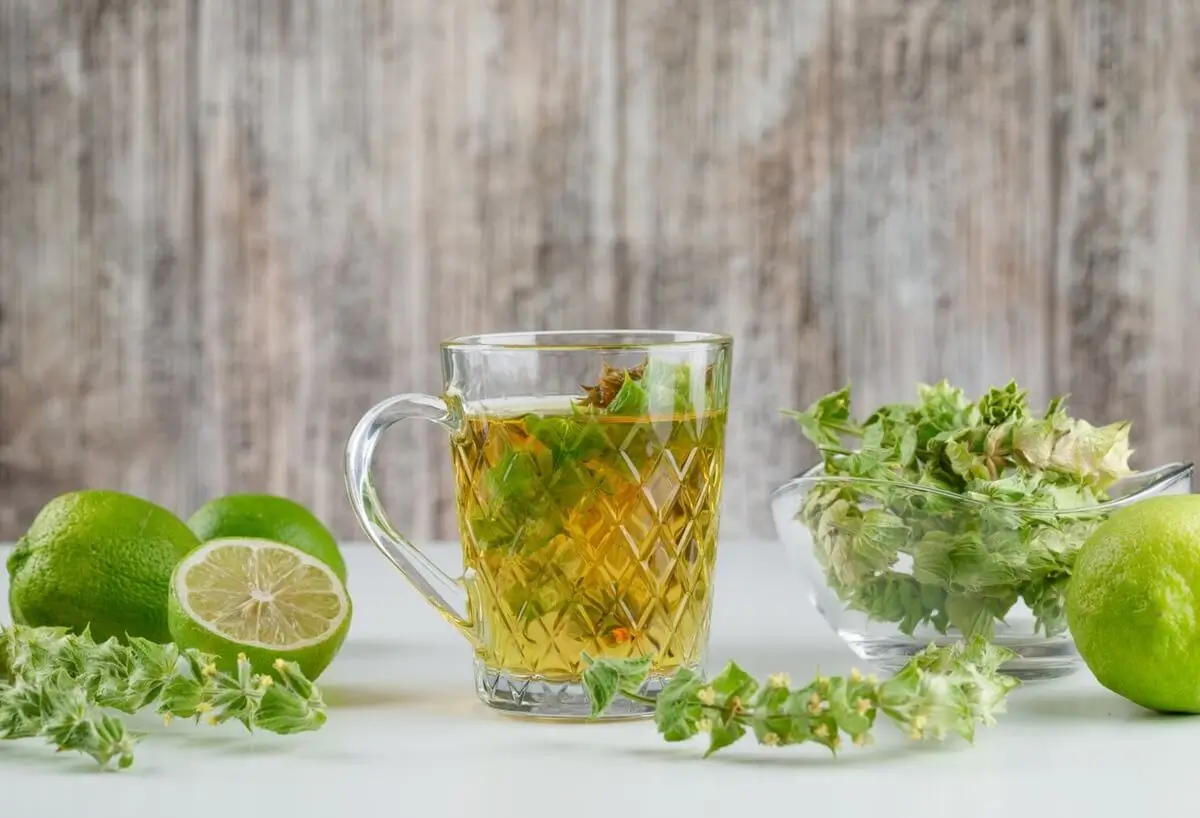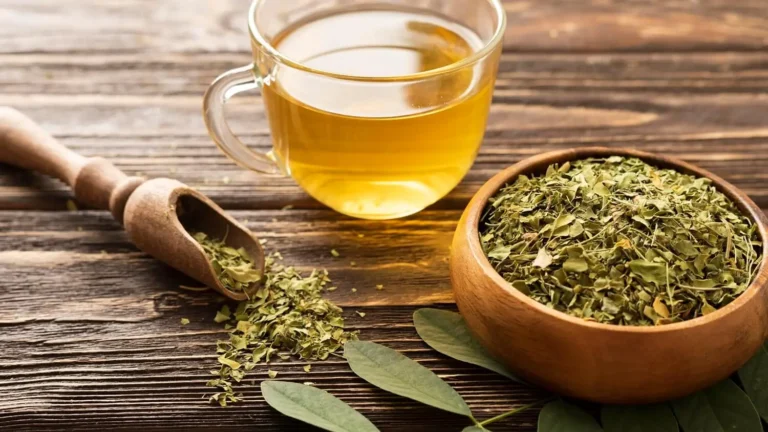Green tea has been used for centuries, not just as a comforting drink but also as a natural way to support health in many different ways. Whether you enjoy it hot, cold, or as a supplement, green tea is a simple way to add something healthy to your daily life.
What Is Green Tea?
Green tea is a type of drink made from the leaves of the Camellia sinensis plant. It has a light, fresh taste and is often enjoyed for both its flavor and possible health benefits. People have been drinking green tea for centuries, especially in places like China and Japan, where it was also used as part of traditional medicine. Today, it’s easy to find in stores as tea bags, loose leaves, powders, or even as part of supplements. Some people drink it to feel more alert, support digestion, or help with weight control, but many simply enjoy it as a healthy and delicious daily habit.
Green Tea Nutrition
Green tea is very low in calories and nutrients, yet it still provides a few helpful compounds.
A typical cup has under 3 calories and no fat, protein, carbs, or sugar – it’s mostly water. You might get a small amount of minerals like calcium, iron, and potassium, but nothing too significant.
What really stands out in green tea is its antioxidants, especially polyphenols, which are natural compounds that may help protect your cells. Green tea also has caffeine – less than black tea or coffee, but still enough to slightly boost your energy and focus. One cup usually has around 28 mg of caffeine, which is about half as much as black tea and much less than coffee.

Benefits of Green Tea
Green tea is more than just a warm, calming drink. It can provide a variety of health benefits that go beyond simple hydration. In the sections below, we’ll cover 20 key green tea benefits of green tea – covering everything from heart health and weight management to brain function and skin improvement. Whether you’re already a fan or just getting curious, this list will help you understand why so many people use it and like it beyond just taste.
1. Rich in Antioxidants
Green tea has lots of antioxidants called polyphenols, which help protect your cells from damage. These compounds may play a role in lowering the risk of heart disease and other chronic conditions. One large study in Japan even found that people who drank at least 5 cups of green tea daily had a lower risk of dying from cardiovascular issues. The antioxidants in green tea are one of the most talked-about green tea benefits.
2. Enhances Brain Function
Green tea may help support brain health thanks to compounds like caffeine and L-theanine. These natural substances can boost alertness, improve mood, and may even help with memory and focus. Some research suggests that regular green-tea drinkers might have a lower risk of cognitive decline with age. While more studies are still needed, adding green tea to your day could offer small but helpful benefits of green tea for mental clarity and long-term brain function.
3. Supports Weight Loss
The benefits of green tea may support weight loss by helping the body burn fat more efficiently. Compounds like EGCG (a type of antioxidant) and caffeine may work together to slightly boost metabolism and fat breakdown. Some studies suggest that drinking green tea regularly can help reduce body weight, especially when combined with a healthy lifestyle. However, the effects are usually modest unless high-concentration extracts are used. It’s not a magic fix, but it can be a helpful part of a weight management plan.
4. May Reduce Risk of Certain Cancers
Benefits of green tea may help lower the risk of developing certain types of cancer. It contains antioxidants like EGCG, which have anti-inflammatory effects that may protect cells from damage linked to cancer. Some studies also suggest that drinking green tea regularly could reduce the chances of cancer coming back. Types of cancer mentioned in research include breast, colon, prostate, liver, and stomach cancer. For the best impact, it’s recommended to drink green tea without milk, as some ingredients in dairy may reduce its antioxidant strength.
5. Promotes Heart Health
Benefits of drinking green tea regularly may support heart health by helping lower cholesterol and improving blood flow. It contains antioxidants like EGCG and flavonoids that can reduce “bad” cholesterol and keep blood vessels relaxed and open. Some studies have linked green tea to a lower risk of stroke, heart attacks, and high blood pressure. People who drink green tea daily may be less likely to suffer from heart-related problems compared to those who don’t. Just be aware that it might interact with certain heart medications like atorvastatin.
6. Helps Regulate Blood Sugar Levels
Green tea may help keep blood sugar levels more stable, especially for people with type 2 diabetes or those at risk. Some studies show that compounds in green tea can improve the body’s insulin response and make it easier to manage glucose levels. In Japan, regular green tea drinkers were found to have a lower chance of diabetes-related complications. Just make sure to skip the sugar – sweetened teas can cancel out the benefit. Choosing unsweetened green tea is a smarter option for blood sugar control.
7. Supports Oral Health
Green tea may be good for your teeth and gums. Some studies have shown a possible connection between green tea and better oral health, thanks to its natural compounds. While early results are promising, most of the research has been done on animals or in labs, not on people. So, it’s too early to say for sure – but if you’re already drinking green tea, it might be giving your mouth a little extra support.
8. Improves Skin Health
Green tea has lots of skin-friendly compounds that help reduce redness, fight acne, and keep skin firm and hydrated. Its antioxidants and anti-inflammatory properties can calm down irritation, while its antibacterial effects help clear clogged pores. Green tea also contains vitamins E and B2, which support smooth, youthful-looking skin. Some people even use it to lower puffiness under the eyes or to stimulate hair growth around brows and scalp.
9. May Delay Signs of Aging
Green tea help slow down signs of aging thanks to its antioxidant content, making your skin look healthier. Compounds like polyphenols support collagen production and improve skin elasticity, which can reduce wrinkles and keep skin looking firm and healthy. Some studies also suggest that green tea extract might help prevent breakouts and calm existing pimples, making it useful for overall skin care. Green tea can be a simple, natural way to support a more youthful look.
10. Boosts Fat Oxidation
Green tea may help your body break down fat more effectively, especially when paired with regular exercise. Its natural compounds, like catechins, support metabolism and increase fat burning during workouts. While the impact isn’t dramatic, it could provide a small boost to fat oxidation and energy use. This makes green tea a helpful, natural addition to an active routine focused on overall health and fitness.
11. Reduces Inflammation
Green tea has antioxidants that can help calm inflammation in the body. These compounds, especially catechins like EGCG, work to fight off cell damage and reduce swelling linked to chronic conditions. Regularly drinking green tea may support your immune system and ease symptoms with issues like arthritis or general aches. It’s a simple way to help your body stay more balanced and reduce stress on your cells caused by inflammation over time.
12. Supports Liver Health
Green tea may help protect the liver by fighting off harmful substances and reducing fat buildup. Its antioxidants, especially EGCG, can support liver function and lower inflammation, which is helpful for people dealing with fatty liver or other liver-related issues. Drinking green tea regularly may also help the liver process toxins more effectively. Just keep in mind that moderation matters – too much green tea, especially in supplement form, might put stress on the liver instead of helping it.
13. May Lower Risk of Type 2 Diabetes
Drinking green tea might help lower the risk of developing type 2 diabetes, according to some studies. People who drink it regularly may have better blood sugar control and a lower chance of diabetes-related complications. However, not all research agrees – some studies suggest the risk may actually increase with too much tea or long-term use. Overall, green tea may support healthier blood sugar levels, but moderation is important.
14. Enhances Physical Performance
Drinking green tea daily may give you a natural energy boost that helps improve physical performance. Thanks to its caffeine content and antioxidants, it can boost alertness, reduce fatigue, and help the body burn fat more efficiently during exercise. It’s not a magic solution, but drinking green tea before a workout might give you a slight edge – without the jitters that come with stronger stimulants.
15. May Support Brain Health as You Age
Another benefit of drinking green tea is that it may help protect your brain as you get older. Some studies suggest that its antioxidants, especially catechins, might lower the risk of memory problems like Alzheimer’s and dementia. These compounds may reduce inflammation and oxidative stress, both of which are linked to age-related brain decline. While more research is needed, regularly drinking green tea could be a simple habit that supports long-term brain health.
16. Improves Mood and Reduces Stress
Pros of green tea is that it contains L-theanine, an amino acid known for its calming effects on the brain. It may help reduce stress and help you feel more relaxed without causing drowsiness. Many people find that sipping green tea during the day helps improve their mood. Combined with a small amount of caffeine, it can also improve alertness and concentration. This makes green tea a gentle option for supporting mental health and managing everyday stress.
17. May Help Prevent Cardiovascular Disease
Green tea may help lower some of the risk factors linked to heart disease, like high blood pressure and cholesterol levels. Some studies suggest that its natural compounds support better heart health by improving blood flow and protecting blood vessels. Many people add green tea to their daily life as a simple step toward supporting cardiovascular health.
18. Supports Digestive Health
Green tea benefits for the stomach may support better digestion. Its natural antioxidants and anti-inflammatory properties can help calm the digestive tract and may ease issues like bloating or gas. Drinking green tea after meals may help feel less heavy or uncomfortable. It may also support healthy gut bacteria, which play a big role in overall digestion and health. Just be mindful of how your body reacts, especially if you’re sensitive to caffeine.
19. Strengthens the Immune System
Green tea contains antioxidants like catechins, which may help the body fight off infections and stay healthy. These compounds support immune function by protecting cells and helping the body respond to harmful invaders. Green tea may even help reduce the severity or length of colds. Drinking it regularly could give your immune system a gentle boost, especially during times of stress or seasonal illness.
20. May Promote Longevity
Drinking green tea regularly might support a longer life. Some studies suggest people who drink several cups a day have a lower risk of death from many causes, including heart-related issues. This could be due to the antioxidants and other protective compounds in green tea that help the body stay healthier over time. While it’s not a magic solution, making green tea a daily habit might give your body extra support to stay strong as you age.
How to Brew Green Tea for Maximum Benefits
To get the Chinese green tea benefits, start by heating water until it’s hot but not boiling – this helps preserve the tea’s antioxidants. In a teapot or heat-safe pitcher, place 4 green tea bags and add a tablespoon of fresh, sliced ginger root. Pour the hot water over the tea and let it steep for 8 to 10 minutes. Remove the tea bags, then stir in 2 tablespoons of lemon juice and 2 tablespoons of honey. You can drink it warm or let it cool and enjoy it iced. Both ways are just as healthy – it’s all up to you.
Are There Any Green Tea Side Effects?
Green tea is generally safe, but too much can cause problems. Here are a few possible side effects to keep in mind:
- Caffeine overload. Drinking too much green tea can lead to anxiety, insomnia, or upset stomach because it has caffeine.
- Sleep issues. Caffeine may interfere with your ability to fall or stay asleep.
- Pregnancy concerns. High intake isn’t recommended during pregnancy or breastfeeding (stick to under 300 mg of caffeine daily).
- Medication interaction. Green tea may alter how certain heart medicines work.
- Nausea or dizziness. Especially on an empty stomach or in large amounts.
Conclusion
Green tea offers a wide range of benefits – from supporting heart and brain health to improving mood, metabolism, and even skin. When brewed correctly and enjoyed in moderation, it can be a simple and enjoyable addition to a healthy lifestyle. While it’s not a magic cure-all, its natural compounds show promising effects backed by numerous research. Green tea is a smart daily habit.
For those who want to experience something beyond tea, holistic therapies like acupuncture in Brooklyn are getting more and more popular. Acupuncture in Clifton can complement the benefits of green tea by helping with stress and relaxation. When combined with healthy habits like green tea use, these practices can help you become healthier. Besides acupuncture, different types of massage therapy in Brooklyn can be used, like Tui Na Massage in Brooklyn.
Besides that, options like herbal medicine in Brooklyn, including moxibustion, offer extra natural support. Herbal remedies, much like green tea, have been used for centuries to make your health better. Together, these methods are a practical and natural way to improve both physical and mental health.
Read also:
- 18 Types of Tea for Weight Loss
- The Ultimate Guide to Gua Sha: Unlock Radiant Skin & Holistic Wellness
- The Influence of Acupuncture on the Nervous System
-
Marina Doktorman, M.S., L.Ac., is an experienced acupuncturist who obtained her Masters of Acupuncture from the Tri-State College of Acupuncture in New York City in 2001. During her studies, she focused on Chinese Herbology, a branch of Traditional Chinese Medicine (TCM) that utilizes herbs to complement acupuncture treatments. Marina is licensed in both New York (NY) and New Jersey (NJ) and holds a Diplomate of Acupuncture from the National Certification Commission for Acupuncture and Oriental Medicine (NCCAOM), indicating her expertise in the field.






